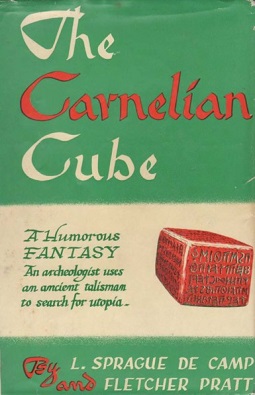The Carnelian Cube

First edition
|
|
| Author | L. Sprague de Camp and Fletcher Pratt |
|---|---|
| Cover artist | David Kyle |
| Country | United States |
| Language | English |
| Genre | Fantasy novel |
| Publisher | Gnome Press |
|
Publication date
|
1948 |
| Media type | Print (Hardback) |
| Pages | 230 pp |
The Carnelian Cube is a fantasy novel written by L. Sprague de Camp and Fletcher Pratt. It was first published in hardcover by Gnome Press in 1948, and in paperback by Lancer Books in 1967. An E-book edition was published by Gollancz's SF Gateway imprint on September 29, 2011 as part of a general release of de Camp's works in electronic form. It has also been translated into Italian and German.
The carnelian cube of the title is a small red "dream stone" confiscated by archaeologist Arthur Cleveland Finch from Tiridat Ariminian, one of the workers on the dig he is supervising in Cappadocia. It bears an inscription in Etruscan that appears to identify its original possessor as Apollonius of Tyana, and supposedly allows the bearer to attain the world of his dreams.
Finch, frustrated with the irrationality of his existence as an archaeologist, yearns for a more rational world in which he could realize his true dream of being a poet. Sleeping with the stone beneath his pillow he finds himself cast into a parallel world. It and later worlds visited by Finch tend to place him in or near his native Louisville, Kentucky rather than the Middle Eastern locale he starts out from, but Kentuckys that, while appearing to share much of the "real" world's history, have developed in radically alternate directions due to differences in their worlds' psychological or physical properties.
Finch's new home sets the pattern; it is entirely too rational, with its denizens acting solely from self-interest in a society organized on a strict patron-client basis. The regimentation extends to naming conventions: people's names are ordered surname first, given name second, and occupation last. Finch initially finds himself classed as "Finch Arthur Poet" — and is, indeed, a poet. Poets are, however, a low-classified occupation, with few perks, certainly as compared to the local patron, Sullivan Michael Politician. Finch's attempts at social climbing, while initially successful, also bring him enemies, eventually making his new world too hot for him. Unfortunately, the stone had not made the trip with him, and Finch's only means of escaping this new and not entirely congenial existence is to purloin its counterpart from the local version of Tiridat.
...
Wikipedia
